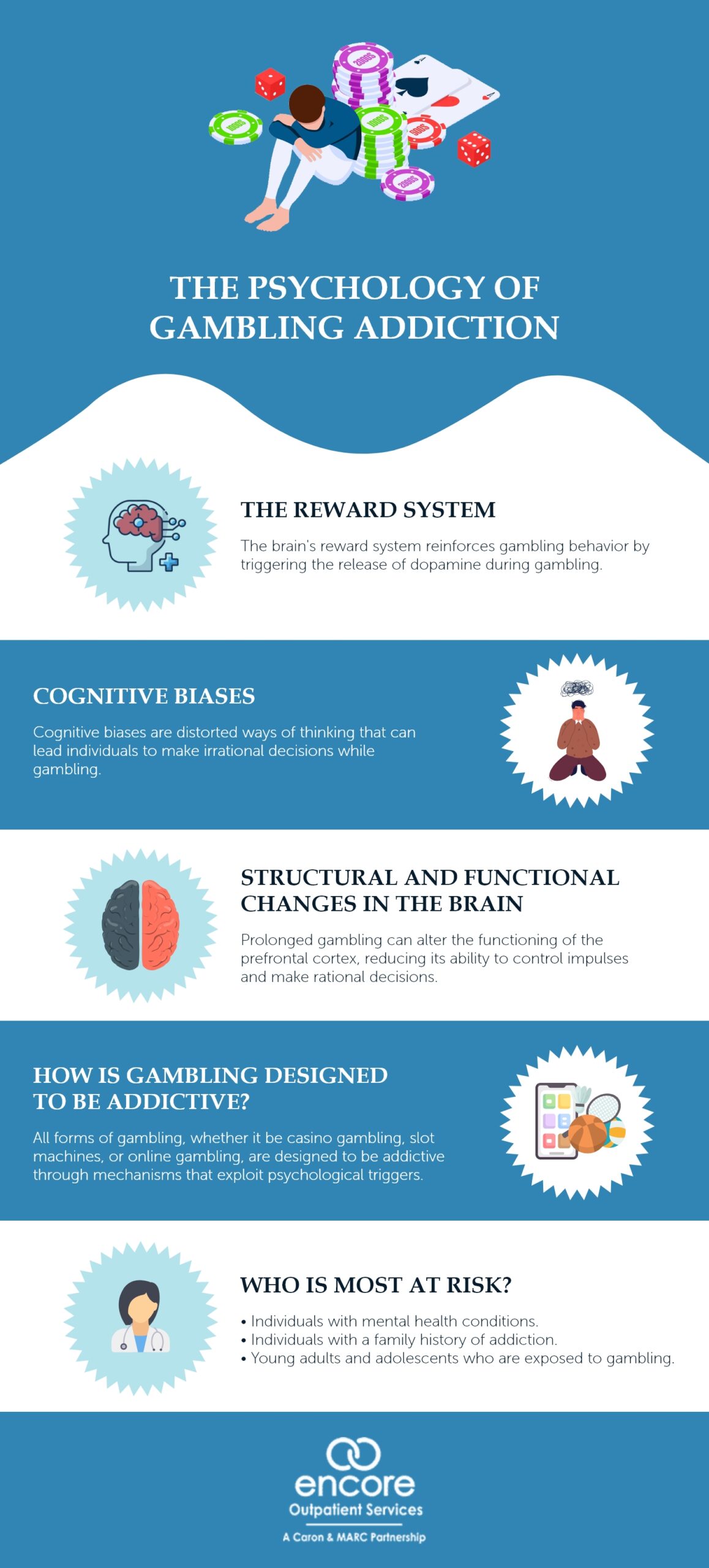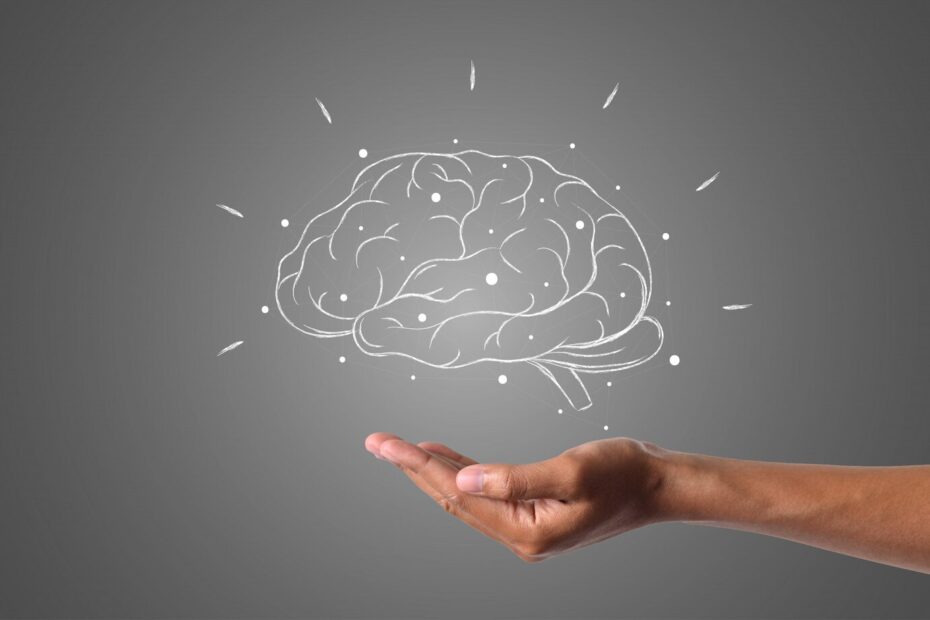Gambling addiction is a complex psychological disorder that affects millions of people worldwide. Understanding the psychology behind this behavioral addiction is crucial for recognizing its causes, identifying its symptoms, and developing effective treatment strategies. This blog post explores the psychological factors that contribute to gambling addiction, shedding light on how the brain’s reward system, cognitive biases, and risk factors play a role in this compulsive behavior.
The Reward System
Gambling activates the brain’s reward system by triggering the release of dopamine, a neurotransmitter associated with feelings of pleasure and excitement. The anticipation and thrill of winning, even if the bet ultimately loses, cause dopamine to be released, reinforcing the desire to continue gambling. Over time, the brain becomes conditioned to seek out this dopamine rush, leading to compulsive gambling behavior.
As gambling continues, the brain can build up a tolerance to the dopamine released during gambling activities. This tolerance means that the same amount of gambling no longer produces the same level of pleasure or excitement, prompting individuals to take bigger risks or gamble more frequently to achieve the desired effect. When attempting to stop, individuals may experience withdrawal symptoms similar to those seen in substance use disorders, making it challenging to break the cycle of addiction without professional assistance.
Cognitive Biases
Cognitive biases play a significant role in the development and persistence of gambling addiction. These biases are distorted ways of thinking that can lead individuals to make irrational decisions while gambling. One common cognitive bias is the “illusion of control,” where individuals believe they can influence the outcome of a game through skill or strategy, even when the results are purely random.
Another key bias is the “gambler’s fallacy,” which is the mistaken belief that past outcomes influence future events in games of chance. For example, they may think that after a series of losses, a win is due, leading them to continue betting despite the odds remaining unchanged.
The “confirmation bias” also contributes to gambling addiction, where individuals focus on and remember their wins more than their losses, reinforcing the belief that they are likely to win again. This selective memory can drive further gambling, even when losses outweigh gains.
Finally, there is the “bandwagon effect.” This cognitive bias can influence individuals to gamble simply because they see others doing it, especially if those others appear successful. This social influence can reinforce gambling behavior by creating a desire to fit in or follow the trend.
Research has shown that individuals with gambling disorder consistently exhibit more cognitive distortions compared to others who don’t gamble. These biases are linked to the severity of gambling problems and can influence treatment outcomes.

Structural and Functional Changes in the Brain
Long-term gambling disorder may lead to structural changes in the brain, particularly in the prefrontal cortex. The prefrontal cortex is responsible for decision-making, impulse control, and regulating behavior. Prolonged gambling can alter the functioning of this area, reducing its ability to control impulses and make rational decisions.
As gambling behavior becomes more compulsive, the prefrontal cortex may undergo changes that weaken its influence over other parts of the brain involved in reward and pleasure, such as the striatum. This imbalance can make it increasingly difficult for individuals to resist the urge to gamble, even when they are aware of the negative consequences.
These structural changes can lead to a cycle of addiction where the ability to make sound judgments is impaired, further entrenching the addictive behavior. Understanding these changes highlights the serious impact of gambling addiction on brain function and underscores the importance of early intervention and treatment.
How Is Gambling Designed to Be Addictive?
All forms of gambling, whether it be casino gambling, slot machines, or online gambling, are designed to be addictive through mechanisms that exploit psychological triggers.
Here are some key ways gambling is designed to be addictive:
- Intermittent Reward System: The unpredictability of winning keeps individuals engaged with the hope of a big payout. This uncertainty triggers the brain’s reward system, reinforcing the behavior and making it difficult to stop. This taps into our natural curiosity and craving for knowledge, encouraging people to keep playing to figure out how the game works.
- Near-Miss Outcomes: Many gambling platforms use near-miss outcomes, where individuals come close to winning but ultimately lose. This creates the illusion of control and encourages continued play, as individuals believe they are close to winning. For example, slot machines have high-value symbols just above or below the pay line to enhance the “near-miss” effect.
- Immersive Environments: Casinos are designed without clocks or windows, causing people to lose track of time and play longer. Online gambling sites achieve similar effects by using bright colors, engaging graphics, and celebratory sounds to create an immersive experience. These elements trigger the brain’s reward system, reinforcing the desire to keep playing, even after losses.
- Gamification Elements: Online gambling platforms often incorporate gamification techniques such as loyalty programs, bonuses, and achievements. These features create a sense of competition and reward, encouraging individuals to gamble more to unlock additional perks and progress in the game.
- Cashless Payments: Physical casinos use chips instead of cash, and slot machines convert money into credits, making it easier for individuals to spend more without fully realizing it. Online gambling platforms further disconnect people from the real value of money by utilizing digital payments like credit cards, e-wallets, and cryptocurrencies. The ease and instant nature of these transactions make it harder for people to keep track of their spending.
These game design elements are specifically structured to maintain engagement and encourage repeat play, contributing to the addictive nature of gambling.
Who Is Most at Risk?
Certain individuals are more susceptible to developing gambling addiction due to a combination of psychological, social, and environmental factors.
- Family History of Addiction: Individuals with a family history of addiction, whether to gambling or substances, may be more prone to developing gambling problems. Genetic predispositions can increase their vulnerability, and learned behaviors from family members who gamble or engage in substance abuse may normalize these activities, making them seem more acceptable.
- Pre-existing Mental Health Conditions: Individuals with mental health conditions such as mood disorders, anxiety, personality disorders, or substance use disorders are at a heightened risk of developing gambling addiction. Gambling is frequently used as a coping mechanism to alleviate emotional distress linked to these conditions. However, the relationship between gambling disorder and mental health is complex and bidirectional. Pre-existing mental health issues can increase susceptibility to gambling addiction, but gambling addiction can also exacerbate or trigger the development of psychiatric disorders, creating a reinforcing cycle that can be challenging to break without intervention.
- Young Adults and Adolescents: Younger individuals are particularly vulnerable due to their early exposure to gambling and social influences that promote it as exciting gameplay. Their ongoing brain development, particularly in the prefrontal cortex, can lead to poor judgment and impulsivity, increasing the likelihood of risky behavior. Research shows that around 5% of teenagers in the U.S. struggle with compulsive gambling, compared to about 1% of adults.
Recognizing these risk factors is essential for identifying those most susceptible to gambling addiction and guiding effective prevention strategies.
Difference Between Compulsive Gambling and Pathological Gambling
The main psychological difference between compulsive gambling and pathological gambling lies in the severity and uncontrollable nature of the gambling behavior:
- Compulsive gambling refers to the uncontrollable urge to gamble despite the negative consequences. Individuals with compulsive gambling find it difficult to resist the temptation to gamble and often experience guilt or regret after gambling.
- Pathological gambling, on the other hand, is a more severe form of gambling addiction that is recognized as a mental health disorder. It involves persistent and recurrent problematic gambling behavior that leads to significant distress or impairment in various aspects of life, such as work, relationships, and finances. A loss of control over gambling, preoccupation with gambling, and continued gambling despite severe consequences characterize pathological gambling.
While compulsive gambling involves an uncontrollable urge to gamble, pathological gambling is a diagnosable disorder that encompasses a broader range of destructive behaviors and consequences. Both require intervention and treatment, but pathological gambling is generally considered more severe.
Prevention: Building Resilience Against Gambling Addiction
Preventing gambling addiction requires a combination of education, awareness, and responsible behavior.
- Public Awareness: One key measure is raising public awareness about the risks of gambling and the early signs of addiction. Educating individuals, especially younger populations, about the potential dangers and how gambling works can help reduce risky behaviors.
- Setting Boundaries: Another effective strategy is to set personal limits on time and money spent gambling. Establishing boundaries before engaging in gambling activities helps individuals stay in control and avoid impulsive decisions.
- Self-Exclusion Programs: Self-exclusion programs offered by many gambling platforms allow individuals to voluntarily block access to gambling sites for a specified period, providing a buffer for those who feel they may be at risk of developing problematic behaviors.
- Seek Help: Finally, promoting mental health support and encouraging individuals to seek help for underlying emotional issues can reduce the likelihood of gambling being used as a coping mechanism for stress or anxiety. Early intervention and support are crucial in preventing the escalation of gambling-related problems.
If you or someone you care about is facing challenges with gambling addiction, Encore Outpatient Services is here to help. With compassionate support, personalized care, and proven treatment programs, we are dedicated to helping you take back control and move toward lasting wellness. Visit Encore Outpatient Services to learn how we can support you on this journey to a healthier, more fulfilling life.
